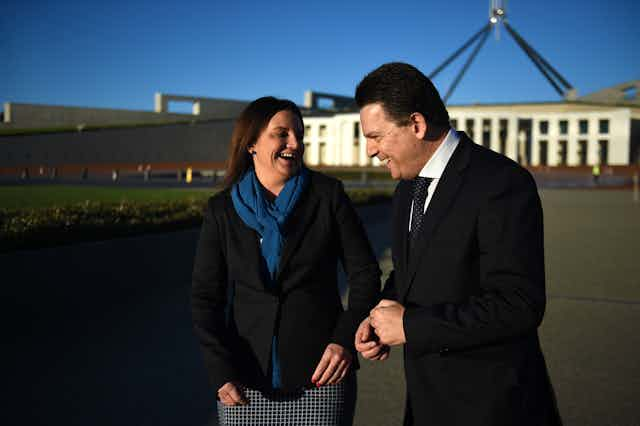In the last few weeks of this longest of election campaigns the conversation has turned to the question of certainty.
The prime minister, Malcolm Turnbull, has been arguing strongly that the Coalition should be re-elected to provide the country with continuity (albeit with change). His call was given additional impetus following the economic doubt produced by the Brexit vote in the UK.
Warning voters against a hung parliament, Turnbull used the Liberal Party launch to describe the prospect of a minority government as parliamentary “chaos”. It’s a term he has used on a number of occasions.
This is something both sides of politics seem to agree on. Bill Shorten recently evaded a question from ABC 7.30 host Leigh Sales about the prospect of forming a minority government with the Greens’ support. Employing a little magical thinking, Shorten argued:
There’s a third option: a Labor Party in government, governing for all Australians.
Developing this theme, Labor wheeled out Paul Keating on the weekend to pummel the Greens in the hotly contested seat of Grayndler, one of a number of inner-city seats the Greens have set their sights on winning. Similarly, Shorten has warned South Australians against voting for the Nick Xenophon Team, describing the new party that is savaging Labor in that state as a “ragtag militia”.
The driving force behind these shared talking points is two-fold. The first is the growing sense that participation is a privilege enjoyed by only the two established party groupings in Australia, so the only way to get into parliament is through the two-party system.
This “cartel” view of politics is demonstrated by the way in which the major parties have adjusted the electoral system over many decades to suit their own interests. These changes include maintaining the requirement of a minimum vote before candidates can access public election funding, and recent Senate reforms. The later changes to the regulation of parties will not be fully felt for several years, when the higher regulatory bar on microparties comes into play.
The second is the way the Australian public perceives the prospect of minority government. It has been argued that this is a comparatively new phenomenon. Certainly, under the leadership of Tony Abbott, the Coalition worked hard to frame minority governments as an inherently bad electoral outcome.
But if we look at survey data from the ANU’s Australian Election Study in the table below, we can see that respondents were significantly less likely to prefer a minority government in the weeks immediately following the 2010 election (when the survey is administered and data collected from the public).

So, the argument that experience with the minority Gillard and Rudd governments of 2010-13 period directly produced this aversion to hung parliaments is not strictly correct. In fact it predated our recent experience.
While the 2016 election may just go to the Coalition on the back of preferences and the ground game in a small number of marginal seats, minority government and Senate independents will emerge as features of Australian public life.
The problem for the parties is that the public engages in seemingly perverse behaviour: they don’t want a minority government, but they are happy to vote for it.
In many ways this shows how terrible elections are at signally policy preferences from the electorate. A vote for a minor or microparty often represents a lack of consensus on policy, rather than a preference for government by coalition or minority.
For all the attempts to eliminate minor and microparties from the political landscape, the trend over the past 50 years has been of voters preferencing minor parties over the established parties. In 2013, one-third of voters preferred a minor party for the Senate. One in five opted for them in the lower house, with the trend line pointing upwards.
Other Westminster nations manage to deal with elections that generate uncertain outcomes. New Zealand is a good example of a comparable country whose electoral system requires a period of extended negotiation with minor parties to form government after an election. This means accepting the possibility of uncertainty: of electoral outcome, but also of conditions that may require parties to change their policies.
Elections are important in setting the stage for policy negotiations that form government. The outcome is uncertain, but it provides the spectacle of actual policy debates conducted before the public. While the Coalition likes to position the Labor Party as conflicted by the rise of the Greens, the prospect of a centrist party or one to the right of the Coalition in Australia is stronger than ever.
Magical thinking aside, the major parties will face the need to negotiate “confidence and supply” agreements with minor parties to form government in the future. That means they will need to prepare the electorate in advance for a lack of certainty.
While there is clearly a tactical advantage in warning against uncertainty, the electorate will need to be educated that the end of an election campaign can be the start of something greater.

